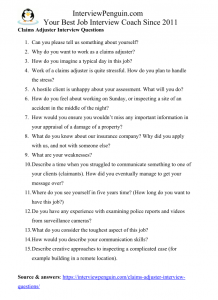Table of Contents
Can you please tell us something about yourself?
Typically the first question, an ice breaker. If you have done anything similar before (for example working for an insurance company on another role), or working as a trainee under a supervision of an experienced adjuster, you should focus mostly on your experience and certification. Obviously if you have a degree in finance or insurance it is a plus and you should mention it.
But many insurance companies run excellent training programs, and you do not need previous experience or university degree to apply for this job with them.
In such situations you can talk about your excellent communication and math skills, interest for insurance business, or basically about anything else. Your motivation and enthusiasm they can hear in your voice matters more than the exact words you use to describe yourself–if they expect to train you in the company.
Why do you want to work as a claims adjuster (specialist)?
Claims adjuster does not belong to jobs children dream about having once they’ll grow up. It’s a specific position, and you should find some specific reasons for your application.
Maybe you apply only becasue you can’t get anything better at the moment, or becasue the job pays relatively well, but you should not say this in an interview. Try to find something positive about the job.
For example you can say that you enjoy the complexity and variety it offers. You will inspect various sites, meet with claimants and witnesses, consult different experts, you will need to use your brain a lot, and your math skills. It’s a job for someone who loves variety, in a perspective industry (insurance), and that’s why you decided for it.
Another reason can be your past experience. Perhaps you worked as a claims analyst or auto damage appraiser, and you would like to continue with your career path. One way or another, they should get a feeling that you really want the job, and made a conscious choice.
How do you imagine a typical day in this job?
It really depends on the job offer, and you should read the job description carefully. However, you can always emphasize traveling to inspect damaged properties, interviewing claimants and witnesses, doing a lot of reporting and administrative work, processing claim reports, and so on.
You should show some flexibility, because something like a typical day of a claims adjuster may not even exist. We do not govern the nature, and cannot predict accidents. Some days you may travel to various sites, even after standard hours, and deal with difficult cases. On other days nothing happens, you spend the hours working on papers, and at 4pm leave the office … but when you are about to leave a phone rings, and you have to make an inspection. Ensure the interviewers that you do not expect a standard routine, and can adjust to changes in your work.
* May also interest you: GEICO interview questions.
Work of a claims adjuster is quite stressful. How do you plan to handle the stress?
Not every client will like your assessment of the situation (especially when you do not decide in their favor). You will hear a lot of bad words in this work, some people may even threaten you. Most people are complete slaves of money, and therefor any talk with an appraiser or examiner can escalate quickly.
What’s more, the unpredictability of the job adds to the stress level claims adjusters typically experience. You have several ways of convincing the hiring managers that you will handle it.
First one is saying that you are not emotional, and do not get involved into any arguments. You know the rules, policies, and also your responsibilities (or you will learn about them), and you won’t consider the emotions of the claimants, or their family situation, or whatever. You will simply estimate if the damage is covered by insurance policies, and you will calculate payments following the rules.
Second option is referring to activities you do outside of work. Hiking in the nature, sports, meditation–all of them can help you to find your balance again, and minimize the negative impact the stress has on your health. In this case you say that you expect to experience some stress (each job has some downsides after all), but you have your remedies, and are confident that you will deal with the pressure. For more ideas, check 7 sample answers to “Can you work under pressure?” interview question.
A hostile client is unhappy about your assessment. What will you do?
The most important thing in this job is to not pay attention to emotions–your emotions, and emotions of other people. Say that you will focus on facts and numbers, and not feelings.
You can also explain that you understand why people are upset. Everyone wants to get the biggest possible payment from an insurance company, to have everything covered. But you know it can’t be always the case.
But since you understand why they are angry or even hostile, you won’t take their bad words personally. You will calmly do your job, and won’t get involved into any conflicts or fights :).
* Special Tip: To know how to answer a question, and to come up with an excellent answer on a big day, when facing a panel of interviewers, are two different things. Have a look at our Interview Success Package. Up to 10 premium answers to each tricky question you may realistically face in the interviews will help you impress any hiring manager, outclass your competitors in an interview, and eventually get the job. Thank you for checking it out!
How do you feel about working on Sunday, or inspecting a site of an accident in the middle of the night?
This rarely happens, but in some extraordinary cases you may be called for an inspection in the middle of the night. You should say that you are aware of this possibility. Certainly you won’t do it every day, but in a case of an emergency you do not mind going above and beyond for your employer. Of course you’ll be properly compensated for your efforts.
Try to show some flexibility in your interview.
How would you ensure you wouldn’t miss any important information in your appraisal of a damage of a property?
You have several good options at this point. When you are just starting in this career field, you can say that you hope to learn everything in your employee training, and from the working manuals. What information to collect, who to consult, and so on.
You can also emphasize your attention to detail and responsibility–you won’t take any case lightly, you will always inspect the damaged property with great care.
If you’ve already been working in the field, you can list common pitfalls, and talk about experts and consultants who can help you with your judgement of the situation (police officers, firefighters, engineers, witnesses, etc).
Other questions you may get in your claims adjuster (specialist) job interview
- What do you know about our insurance company (Progressive insurance, or other)? Why did you apply with us, and not with someone else?
- What are your weaknesses?
- Describe a time when you struggled to communicate something to one of your clients (claimants). How did you eventually manage to get your message over?
- Where do you see yourself in five years time? (How long do you want to have this job?)
- Do you have any experience with examining police reports and videos from surveillance cameras?
- What do you consider the toughest aspect of this job?
- How would you describe your communication skills?
- Describe creative approaches to inspecting a complicated case (for example building in a remote location).
- Do you have any questions?
Final thoughts
Interview for a job of claims adjuster belongs to tricky interviews. It is an atypical position, and various insurance companies use different interviewing techniques when trying to find right job applicants.
Some companies will use questions, just like I described in the article. Some other, however, will work mostly with tests (IQ test, test of your communication skills, role play, etc). They will hire anyone who meets the requirements in terms of IQ and personal traits, and will leave the rest for their employee training…
One way or another, you should prepare for the things you can prepare for in advance. IQ test does not belong to this category. But you definitely can prepare a short answer to each question from this article (check out our Interview Success Package if you struggle to come up with good answers), and you can also do a good research about your prospective employer.
Do the most you can to prepare in advance. Whether it will be enough to succeed I cannot really say, since this is a tricky interview, and at times you also need a bit of luck :).
Matthew
* You can also download the list of questions in a one page long PDF, and practice your interview answers anytime later:
May also interest you:
- Allstate interview questions.
- State Farm interview questions.
- Salary negotiation tips – Claims adjusters earn decent money, and you can make it even better, once you learn how to negotiate your salary in the interviews.



